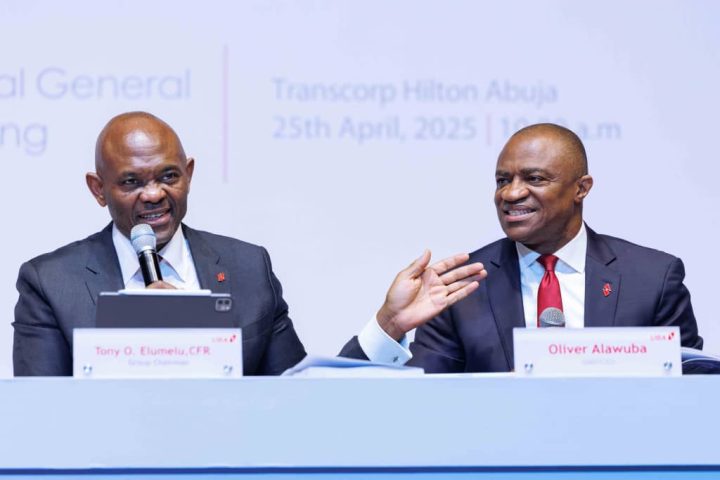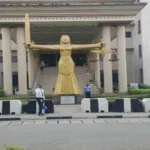Paul Alaje, chief economist at SPM Professionals, has stated that the new national minimum wage may not be less than N100,000.
He made this statement in an interview in light of the May 1st Workers Day, where he discussed various economic policies made by the Federal Government, including the recent increase in interest rates by the Central Bank of Nigeria.
Join our WhatsApp ChannelAlaje expressed concerns about the impact of the interest rate hike on the private sector, stating that it would lead to a decrease in investments and an increase in unemployment.
“What do you think of the Central Bank of Nigeria stimulating this program at this point? I mean, initially at 15.75%, then to 22.75%, and then to 24.75%. This has tremendous implications for the private sector, individuals, the government, and most importantly the people of Nigeria. Well, it will be relatively difficult for the private sector to borrow money or to borrow new money and some banks will write the existing customer rates review because the baseline for lending has changed. So, when it changes and it goes up, it means that the cost of borrowing would also increase.”
He also mentioned that the goal of the Central Bank to combat inflation through this policy may not be effective, as the main cause of inflation is not monetary reasons but rather institutional factors such as supply shortages and insecurity.
READ ALSO: Minimum Wage: NLC Proposes Fresh N615,000 Monthly
“The goal of the Central Bank for increasing MPR is actually to combat inflation and to stabilise the economy because, according to the Central Bank, the money supply has increased. We just ended a regime where money was printed endlessly. We can print in such a manner and expect inflation not to surge. Unfortunately, inflation is now at over 33%. The CBN feels that by increasing rates, we are going to have a lower rate of inflation but unfortunately, while they think it will be reducing, it seems to be going high because we believe that the main cause of inflation is not just monetary reasons.”
“The authority must also take some level of responsibility in terms of what is inducing inflation because, in the real sense, institutional things are causing inflation in Nigeria, which, of course, most of them are supply shortages of farm outputs due to banditry and insecurity in the North to high costs and means of moving articulated vehicles from farm centres. These are real issues embattling our nation and this is why inflation is high. So, what are people saying? This will cause an increase, and technically speaking, in economics, we call it unemployment, because unemployment will increase if people don’t invest; they will not increase the number of employments.”
Regarding the demand for a new national minimum wage by the Organised Labour, Alaje believes that the amount of N615,000 requested is not attainable, considering the current economic crisis. He suggests that a minimum wage between N100,000 and N200,000 is more realistic, given the current economic situation.
Alaje also criticized the recent electricity tariff hike, stating that it was not justified and that the private sector could not afford it. He called for the government to review the contract of the Distribution Companies (Discos) and ensure that Nigerians receive fair value for the prices they pay.
“What Nigeria has paid over the years has been minimum wage, not living wage. They are two different things. Since time immemorial, Nigeria’s minimum wage has been pegged between $100 to $200. So, for the sake of convenience, what Labour should be looking at as minimum wage should be between N100,000 to N200,000 and I can tell you that the chances are very high that President Tinubu will announce that. He will announce between N100,000 and N200,000 on the 1st of May.”
Additionally, Alaje expressed concerns about the Economic and Financial Crimes Commission’s crackdown on currency speculators and cryptocurrency platforms, stating that it may not have a positive impact on the economy. He advised the government to regulate cryptocurrency trading and ensure transparency to prevent fraud and protect citizens’ funds.
“I strongly advise that the government put regulations in place. I strongly advise that the government regulate the cryptocurrency business and anyone who wants to do such a business in Nigeria should also pay the necessary taxes that are due to the government. My concern about crypto and other schemes is that transparency is an issue.”
“People have been duped over some time and some websites will just disappear and people’s money will vanish, but I’m putting a caveat because this is not the reality of raw crypto. For the genuine ones, can we now study the model and their countries of origin and see the policies we can put in place if our people must participate in it?”
However, Alaje commented on the International Monetary Fund’s forecast that Nigeria’s economy will slip to fourth place this year, stating that this can be prevented by ensuring the naira has sufficient value and reversing the currency devaluations.
Emmanuel Ochayi is a journalist. He is a graduate of the University of Lagos, School of first choice and the nations pride. Emmanuel is keen on exploring writing angles in different areas, including Business, climate change, politics, Education, and others.















![Trump, Zelenskyy Discuss Peace Plans During Pope Francis’ Funeral In Rome [VIDEO]](https://www.primebusiness.africa/wp-content/uploads/2025/04/Trump-and-Zelenksy-meet-at-Pope-Francis-Burial-150x150.jpeg)



Follow Us